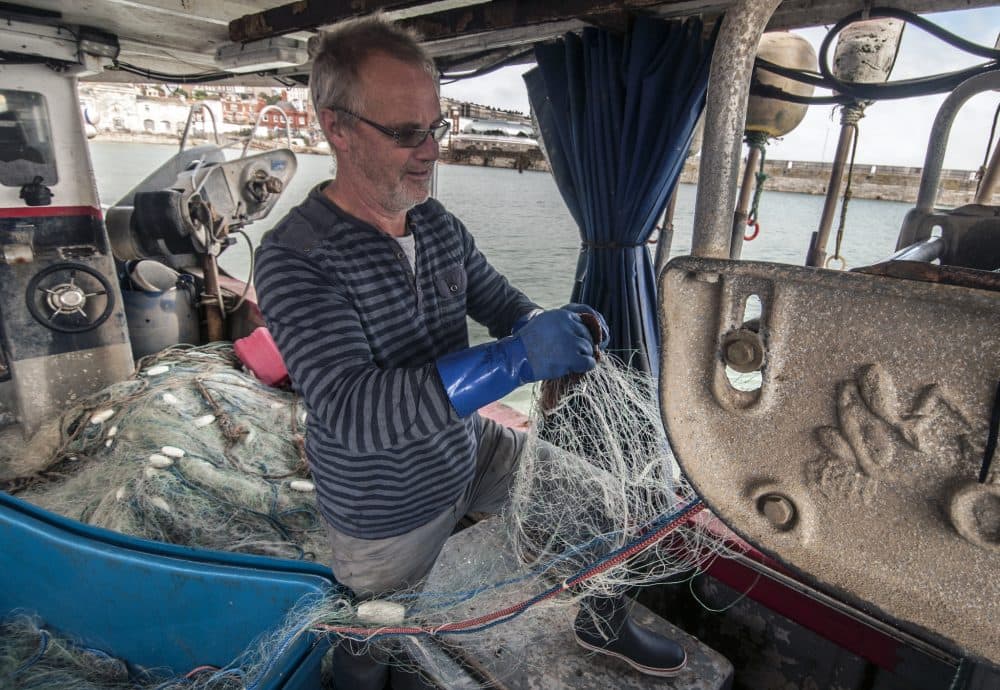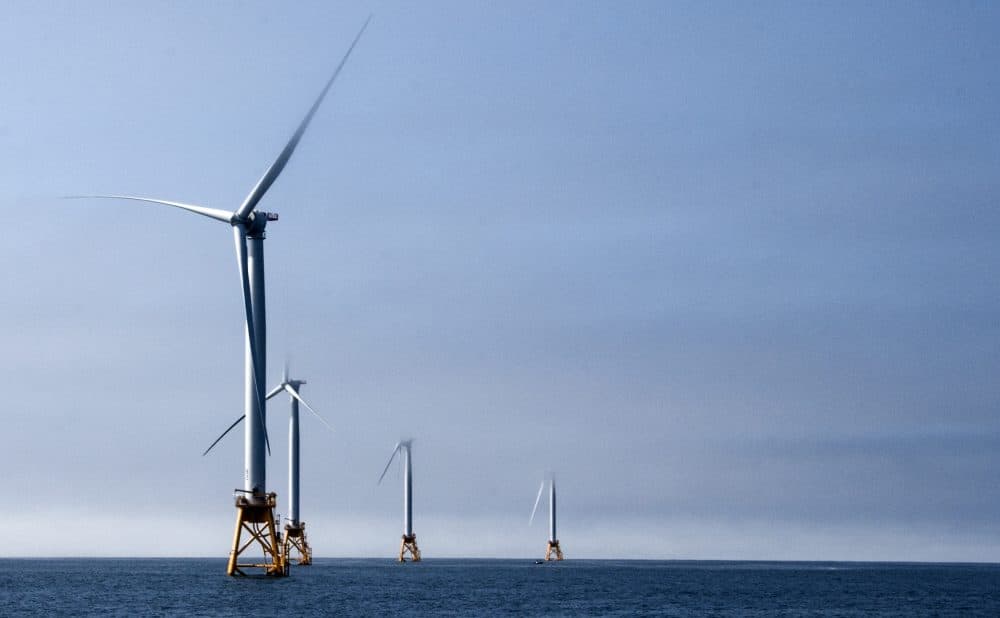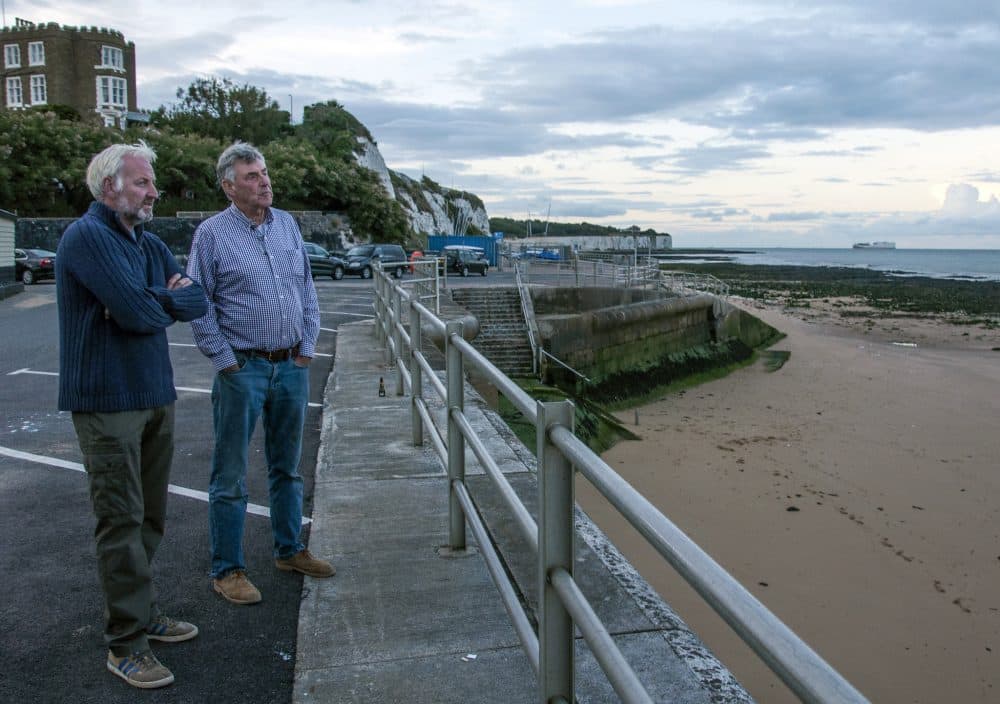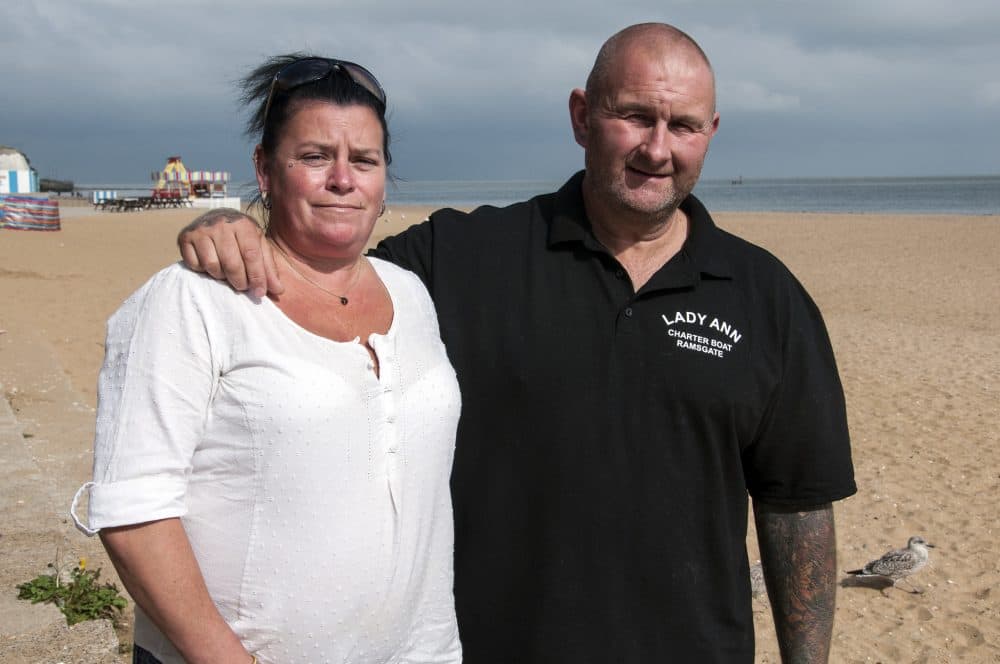Advertisement
Why Some Fishermen Are Wary Of Offshore Wind Farms
Resume
Part 2 of a two-part story. Here's Part 1.
It’s a sunny afternoon in the English town of Ramsgate, and Steve Barratt is getting ready to fish. He’s on the deck of his boat, the Razorbill, running a massive tangle of nets through a squeaky pulley.
There’s a fish still stuck in one, so he tosses it to the side. "There’s one I missed. That’s a Dover sole. So that’ll be my dinner later," he says, laughing.
Once Barratt departs, it’ll be a long trip to waters near the Netherlands, where he’ll fish for more Dover sole.
“At the moment I’m having to steam three hours to catch fish," he says. "Two reasons I’m having to steam three hours: one, to try and avoid fish I have no quota for, and the other reason is the wind farm’s in the way.”
Barratt’s talking about a wind farm in the Thames Estuary that’s been in operation for the past seven years. It’s one of four off the coast of this region of England, and there are plans for an expansion.
Barratt says he's lost valuable fishing ground to the wind farm. And he worries new wind farms will drive fish even further away.
Those are concerns echoed by some fishermen in New England, where states including Massachusetts hope the next boom in offshore wind will take off. The fishermen worry that wind farms will disrupt fisheries and make it even harder to make a living.
But European wind farm developers -- some of whom are working on proposals to build in the United States — say their industry can coexist with fishing. And they point to scientists to make their case.

Tracey Dalton, of the University of Rhode Island, is studying how the only offshore wind farm currently running in the U.S. is affecting fishermen there.
Her team is still gathering data, but she says so far some sport fishermen are reporting that the five turbines of the Block Island Wind Farm might actually be attracting fish, like an artificial reef.
“A lot of charter boat captains are now taking people out for tours of the wind turbines, or they’re targeting fish around the turbines," she says. "So that’s kind of an interesting change in how the area is being used."
Dalton says commercial fishermen, on the other hand, are skeptical. There haven’t been a lot of long-term studies of how wind farms impact fisheries after they’re up and running.
And the Block Island Wind Farm is just five turbines. Meeting Massachusetts’ energy goals could mean hundreds more.
That could make some parts of the East Coast look more like the English coast, where offshore wind farms are an increasingly common sight.

From a seaside bluff in Broadstairs, another harbor just up the road from Ramsgate, you can just make out the north coast of France. And much closer, a row of wind turbines -- the same farm fisherman Barratt will head through later on his way to Dutch waters.
That's where I meet John Nichols, who helps run the local fishermen’s association. He says 10 years ago, fishermen here thought offshore wind was a pipe dream. By the time they got together to oppose it, it was too late.
Nichols says New England’s fishermen shouldn’t waste time fighting wind farm developers. Instead, he says, they should form fishermen's associations to increase their bargaining power.
"You can’t work against them, you’ve got to work with them," he says. "But if you’re one fisherman going to a developer, he won’t have any time for you. But if you’re, in our case 40-plus boats, then they will listen to you. And I think that’s the most important thing: strong, it can be small, but strong associations."
As the offshore wind industry has ballooned in the U.K., the reaction from some British fishermen has been: If you can't beat em, join em.
Jason Parrott used to fish out of Ramsgate as a skipper for two vessels, but found himself without a job when the owner of the boats sold them off seven years ago.
"And basically he told me overnight that he was selling both boats," he says. Parrott says the decision made him worried about paying his bills.

Within the hour he says he was texting a friend who worked with one of the new wind companies in town. He landed a job for a wind farm catamaran, ferrying technicians out to the turbines for daily maintenance.
Parrott says he used to love living off the sea, so while driving a wind farm vessel is more stable than the boom and bust of being a commercial fisherman, he's missing something in his new job.
"The main aspect of it is the boredom," he says. "When we actually drop the technicians off we’re out there for eight hours. And even though they’re magnificent, luxurious boats, you’re still sitting there, and I was always active. The others were all used to it, they could sit there all day with a DVD. That was the hardest transition for me."
Back at the harbor in Ramsgate, another wind farm vessel pulls back into port down the pier from Barratt, who is almost ready to go out for the evening.
Barratt says he'll never take a job with the wind farms, like Parrott and many of his former colleagues have. And he has this advice for fishermen in New England thinking of jumping ship: “Really you’re nothing other than a floating taxi. And just eat grub all day and get fat. If that’s what you want to do, there will be jobs. If you want to be a fisherman for the next 20, 30 years or however long it is, I suggest you and your community oppose it at every stage possible."
Some fishermen in the U.S. are taking their fight to court. In September a group of fishing organizations sued to stop a wind farm planned off the coast of New York.
For Barratt’s part, he says he's done fighting. Like a lot of older fishermen, he’s gotten used to dealing with change -- even sharing the ocean with wind farms.
As he nears retirement, there aren't many younger fishermen left in Ramsgate to replace him. But wind farm technician? That's a growth industry.
Chris Bentley is a producer at Here & Now. You can follow him on Twitter @Cementley. Chris’ reporting was supported by the Heinrich Böll Foundation.
This segment aired on January 17, 2018.